Taiwan–United States relations
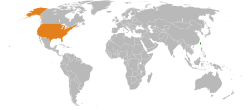 |
|
Taiwan |
United States |
|---|---|
| Diplomatic Mission | |
| Taipei Economic and Cultural Representative Office in the United States | American Institute in Taiwan |
Taiwan and the United States have maintained unofficial relations since 1979. The official relations between the government of the Republic of China on Taiwan and the federal government of the United States terminated due to the recognition of Beijing. The United States has relations with the 'people on Taiwan' with the Taiwan Relations Act. The policy of deliberate ambiguity of US foreign policy to Republic of China is important to stabilize cross-strait relations and to assist ROC from PRC invasion if possible, whereas a policy of strategic clarity on Taiwan will induce PRC opposition and challenges US legitimacy in East Asia or beyond.[1][2][3]
History
Pre–1945
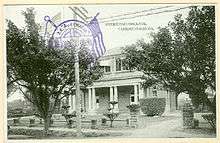
Some Americans advocated for the purchase of the island of Taiwan from China.[4][5][6] Aboriginals on Taiwan often attacked and massacred shipwrecked western sailors.[7][8][9][10] In 1867, during the Rover incident, Taiwanese aborigines attacked shipwrecked American sailors, killing the entire crew.[11] They subsequently skirmished against and defeated a retaliatory expedition by the American military and killed another American during the battle.[12]
In the Japanese era, the United States also hosted a consulate in Taihoku, Formosa (today Taipei) from 1913. The consulate was closed in 1941 due to United States declaration of war on Japan. The site is now protected as the Former American Consulate in Taipei.
1945–1949
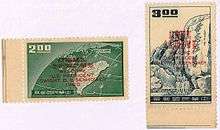
In October 1945, the representatives of Chiang Kai-shek, on behalf of the Allied Powers, were sent to Taiwan to accept the surrender of Japanese troops. However, during the period of the 1940s, there was no recognition by the United States Government that Taiwan had ever been incorporated into Chinese national territory.[13] Chiang continued to remain suspicious of the American motives.[14]
1949–1979
1979–present



.jpg)
At the height of the Sino-Soviet Split, and at the start of the reform and opening of People's Republic of China, the United States strategically switched diplomatic recognition from the Republic of China (ROC) to the People's Republic of China (PRC) on January 1, 1979 to counter the political influences and military threats from the Soviet Union. The US Embassy in Taipei was 'migrated' to Beijing and the Taiwanese Embassy in the US was closed. Following the termination of diplomatic relations, the United States terminated its Mutual Defense Treaty with Taiwan on January 1, 1980.
On April 10, 1979, U.S. President Jimmy Carter signed into law the Taiwan Relations Act (TRA), which created domestic legal authority for the conduct of unofficial relations with Taiwan. U.S. commercial, cultural, and other interaction with the people on Taiwan is facilitated through the American Institute in Taiwan (AIT), a private nonprofit corporation. The Institute has its headquarters in the Washington, DC area and has offices in Taipei and Kaohsiung. It is authorized to issue visas, accept passport applications, and provide assistance to U.S. citizens in Taiwan. A counterpart organization, the Taipei Economic and Cultural Representative Office in the United States (TECRO), has been established by Taiwan. It has its headquarters in Taipei, the representative branch office in Washington, DC, and 11 other Taipei Economic and Cultural Offices (TECO) in the continental U.S. and Guam. The Taiwan Relations Act (TRA) continues to provide the legal basis for the unofficial relationship between the U.S. and Taiwan, and enshrines the U.S. commitment to assisting Taiwan maintain its defensive capability.
After de-recognition, the U.S. still maintains unofficial diplomatic relations with Taiwan through Taipei Economic and Cultural Representative Office; the current head of TECRO in Washington, D.C. is Stanley Kao. The American Institute in Taiwan, a non-profit institute headquarters in the US soil under the laws of the District of Columbia in Arlington County, Virginia and serves as the semi-official, working-level US representation and AIT has branch offices in Taipei and Kaohsiung. The Chairman of AIT is Raymond Burghardt. Christopher J. Marut was appointed to be the new AIT Taipei Office Director in August 2012.[15][16] With the absence of diplomatic recognition, in the present state, Taiwan-US relations are formally guided by the service of enactment of Taiwan Relations Act by US Congress for the continuation of Taiwan-US relations after 1979. In 2013, Taiwan Policy Act of 2013 was raised and passed in House Committee on Foreign Affairs by the US Congress to update the condition of US-Taiwan relations.[17][18] In 2015 Kin Moy was appointed to the Director of the AIT.
U.S. commercial ties with Taiwan have been maintained and have expanded since 1979. Taiwan continues to enjoy Export-Import Bank financing, Overseas Private Investment Corporation guarantees, normal trade relations (NTR) status, and ready access to U.S. markets. In recent years, AIT commercial dealings with Taiwan have focused on expanding market access for American goods and services. AIT has been engaged in a series of trade discussions, which have focused on protection of intellectual property rights and market access for U.S. goods and services.
On December 16, 2015, the Obama administration announced a deal to sell $1.83 billion worth of arms to the Armed Forces of Taiwan, a year and eight months after U.S. Congress passed the Taiwan Relations Act Affirmation and Naval Vessel Transfer Act of 2014 to allow the sale of Oliver Hazard Perry-class frigates to Taiwan. The deal would include the sale of two decommissioned U.S. Navy frigates, anti-tank missiles, Assault Amphibious Vehicles, and FIM-92 Stinger surface-to-air missiles, amid the territorial disputes in the South China Sea.[19][20] China's foreign ministry had expressed its disapproval for the sales and issued the U.S. a "stern warning", saying it would hurt China–U.S. relations.[21]
Notable issues
Officially, the United States has supported the One-China policy since WWII, which acknowledged only one government as the sole legal government of China. In 1949, when Generalissimo Chiang Kai-shek's armies decamped to Taiwan at the end of the Chinese civil war, Washington continued to recognize Chiang's "Republic of China" as the government of all China. In late 1978, Washington announced that it would break relations with the government in Taipei and formally recognize the People's Republic of China (PRC) as the "sole legal government of China." [22]
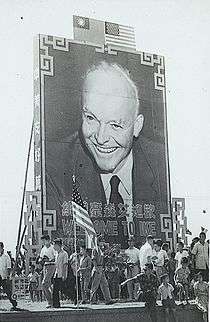
Washington's "one China" policy, however, does not mean that the United States recognizes, nor agrees with Beijing's claims to sovereignty over Taiwan.[23][22] While during Reagan Administration when Republican was in charge of the office, on July 14, 1982, Washington gave specific assurances to Taiwan that the United States did not accept China's claim to sovereignty over the island (Six Assurances),[24][22] and the U.S. Department of State informed the Senate that "[t]he United States takes no position on the question of Taiwan's sovereignty."
The U.S. Department of State, in its U.S. Relations With Taiwan fact sheet, states "The United States and Taiwan enjoy a robust unofficial relationship. The 1979 U.S.-P.R.C. Joint Communique switched diplomatic recognition from Taipei to Beijing. In the Joint Communique, the United States recognized the Government of the People's Republic of China as the sole legal government of China, acknowledging the Chinese position that there is but one China and Taiwan is part of China.[25]
The United States position on Taiwan is reflected in "the six assurances to Taiwan", the Three Communiqués, and the Taiwan Relations Act (TRA).[26] The Six Assurances include: 1. The United States has not agreed to set a date for ending arms sales to Taiwan; 2. The United States has not agreed to hold prior consultations with the Chinese on arms sales to Taiwan; 3. The United States would not play any mediation role between Taiwan and Beijing; 4. The United States has not agreed to revise the Taiwan Relations Act; 5. The United States has not altered its position regarding sovereignty over Taiwan; and 6. The United States would not exert pressure on Taiwan to enter into negotiations with the Chinese.[27] The "Three Communiqués" include The Shanghai Communiqué, The Normalisation Communiqué, and The August 17 Communiqué, which pledged to abrogate official US-ROC relations, remove US troops from Taiwan and gradually end the arms sale to Taiwan, but with the latter of no timeline to do so, an effort made by James Lilley, the Director of American Institute in Taiwan.
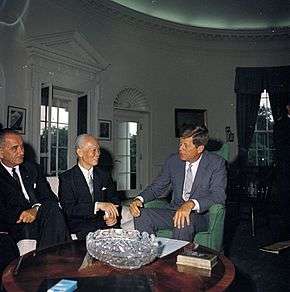
Despite friendly relations with China, United States President George W. Bush was asked on 25 April, 2001, "if Taiwan were attacked by China, do we (The U.S.) have an obligation to defend the Taiwanese?" He responded, "Yes, we do...and the Chinese must understand that. The United States would do whatever it took to help Taiwan defend herself."[28] He made it understood that "though we (China and the U.S.) have common interests, the Chinese must understand that there will be some areas where we disagree." [28]
On 19 June, 2013, ROC Ministry of Foreign Affairs expressed gratitude for a US Congress's bill in support of Taiwan's bid to participate in the International Civil Aviation Organisation (ICAO).[29] On July 12, 2013, US President Barack Obama signed into law H.R. 1151, codifying the US government’s full support for Taiwan’s participation in the ICAO as a non-sovereign entity.[30] The United States has continued the sale of appropriate defensive military equipment to Taiwan in accordance with the Taiwan Relations Act, which provides for such sales and which declares that peace and stability in the area are in U.S. interests. Sales of defensive military equipment are also consistent with the 1982 U.S.-P.R.C. Joint Communiqué.
Maintaining diplomatic relations with the PRC has been recognised to be in the long-term interest of the United States by seven consecutive administrations; however, maintaining strong, unofficial relations with Taiwan is also a major U.S. goal, in line with its desire to further peace and stability in Asia. In keeping with its China policy, the U.S. does not support de jure Taiwan independence, but it does support Taiwan's membership in appropriate international organisations, such as the World Trade Organisation, Asia-Pacific Economic Cooperation (APEC) forum, and the Asian Development Bank, where statehood is not a requirement for membership. In addition, the U.S. supports appropriate opportunities for Taiwan's voice to be heard in organisations where its membership is not possible.
.jpg)
On August 24, 2010, the United States State Department announced a change to commercial sales of military equipment in place of the previous foreign military sales in the hope of avoiding political implications.[31] However pressure from the PRC has continued and it seems unlikely that Taiwan will be provided with advanced submarines or jet fighters.[32]
Taiwan has indicated that it is willing to host national missile defense radars to be tied into the American system, but is unwilling to pay for any further cost overruns in the systems.[33]
Taiwan has denied that they are providing American military secrets to the PRC.[34]
On December 2 2016, U.S. President-Elect Donald Trump accepted a congratulatory call from Taiwanese President Tsai Ing-Wen in a phone call, which was the first time since 1979 that a President-Elect has publically spoken to a leader of Taiwan.[35][36] PRC Foreign Minister Wang Yi soon made a statement saying that China opposes any move to separate the country, without explicitly mentioning the phone call between Tsai and Trump.[37]
See also
- Foreign relations of Taiwan
- Foreign relations of the United States
- Political Status of Taiwan
- China–United States relations
- United States beef imports in Taiwan
- List of US arms sales to Taiwan
- Twin Oaks (Washington, D.C.)
References
![]() This article incorporates public domain material from the United States Department of State website http://www.state.gov/r/pa/ei/bgn/index.htm (Background Notes).
This article incorporates public domain material from the United States Department of State website http://www.state.gov/r/pa/ei/bgn/index.htm (Background Notes).
- ↑ https://repository.library.georgetown.edu/bitstream/handle/10822/553551/ogdenThomas.pdf;sequence=1
- ↑ http://fpc.state.gov/documents/organization/213994.pdf
- ↑ https://www.researchgate.net/publication/229051924_Comprehending_strategic_ambiguity_US_policy_toward_the_Taiwan_Strait_security_issue
- ↑ Leonard H. D. Gordon (2009). Confrontation Over Taiwan: Nineteenth-Century China and the Powers. Lexington Books. pp. 32–. ISBN 978-0-7391-1869-6.
- ↑ Shiyuan Hao (15 December 2015). How the Communist Party of China Manages the Issue of Nationality: An Evolving Topic. Springer. pp. 165–. ISBN 978-3-662-48462-3.
- ↑ Cultural Identity and the Making of Modern Taiwanese Painting During the Japanese Colonial Period (1895--1945). ProQuest. 2008. pp. 34–. ISBN 978-0-549-98647-8.
- ↑ Harris Inwood Martin (1949). The Japanese Demand for Formosa in the Treaty of Shimonoseki, 1895. Stanford Univ. p. 23.
- ↑ Ronald Stone Anderson (1946). Formosa Under the Japanese: A Record of Fifty Years' Occupation ... Stanford University. p. 63.
- ↑ Andrew Jonah Grad (1942). Formosa Today: An Analysis of the Economic Development and Strategic Importance of Japan's Tropical Colony. AMS Press. p. 16. ISBN 978-0-404-59526-5.
- ↑ John Fisher; Antony Best (2011). On the Fringes of Diplomacy: Influences on British Foreign Policy, 1800-1945. Ashgate Publishing, Ltd. pp. 185–. ISBN 978-1-4094-0120-9.
- ↑ Japan Weekly Mail. Jappan Meru Shinbunsha. 1874. pp. 263–.
- ↑ The Nation. J.H. Richards. 1889. pp. 256–.
- ↑ "Plebiscite Proposal". Retrieved December 12, 2009.
- ↑ Jonathan Fenby (2005). Chiang Kai Shek: China's Generalissimo and the Nation He Lost. Carroll & Graf Publishers. p. 413. ISBN 0-7867-1484-0. Retrieved June 28, 2010.
- ↑ "American Institute in Taiwan".
- ↑ http://www.roc-taiwan.org/ct.asp?xItem=276813&ctNode=2237&mp=2
- ↑ "H.R. 419, Taiwan Policy Act of 2013".
- ↑ http://www.gpo.gov/fdsys/pkg/BILLS-113hr419ih/pdf/BILLS-113hr419ih.pdf
- ↑ "US to sell arms to Taiwan despite Chinese opposition". BBC News. December 16, 2015. Retrieved December 17, 2015.
- ↑ "Obama to push ahead on Taiwan frigate sales despite Chinese anger". CNBC. Reuters. December 14, 2015. Retrieved December 17, 2015.
- ↑ "China warns against first major US-Taiwan arms sale in four years". The Guardian. Reuters. December 16, 2015. Retrieved December 17, 2015.
- 1 2 3 "Stating America's Case to China's Hu Jintao: A Primer on U.S.-China-Taiwan Policy". The Heritage Foundation.
- ↑ "Stating America's Case to China's Hu Jintao: A Primer on U.S.-China-Taiwan Policy". The Heritage Foundation.
- ↑ For a detailed description of the U.S. "one China" stance, see Ambassador Harvey Feldman, "A Primer on U.S. Policy Toward the `One-China' Issue: Questions and Answers," Heritage Foundation Backgrounder No. 1429, April 12, 2001.
- ↑ http://www.state.gov/r/pa/ei/bgn/35855.htm
- ↑ "Stating America's Case to China's Hu Jintao: A Primer on U.S.-China-Taiwan Policy". The Heritage Foundation.
- ↑ Testimony of John H. Holdridge, Assistant Secretary of State for East Asian Affairs, in hearing, China-Taiwan: United States Policy, Committee on Foreign Affairs, U.S. House of Representatives, 97th Cong., 2nd Sess., August 18, 1982, pp. 15-16. Holdridge described the Six Assurances in his memoir, Crossing the Divide, p. 232.
- 1 2 http://more.abcnews.go.com/sections/us/dailynews/taiwan010425.html
- ↑ "Taiwan grateful for U.S. House support for ICAO bid".
- ↑ "US passes law supporting Taiwan ICAO bid".
- ↑ ROC Central News Agency U.S. arms sales to return to normal track: Taiwan official
- ↑ Waldron, Greg. "Outlook gloomy for Taiwan F-16 C/D deal." Flight International, May 26, 2011.
- ↑ "Taiwan rejects further advanced radar system price hikes." CNA, June 14, 2011.
- ↑ "Taiwan denies reported leaks of weapons secrets to China". WantChinaTimes.com. October 26, 2014. Retrieved October 26, 2014.
- ↑ "Trump risks showdown with China after call with Taiwan". CNN. 2 December 2016. Retrieved 3 December 2016.
- ↑ "Trump speaks with Taiwanese president, a major break with decades of U.S. policy on China". Washington Post.
- ↑ http://english.cctv.com/2016/12/03/VIDEKjcrctY9nIr7Zcu2E1d5161203.shtml
Further reading
- Benson, Brett V., and Emerson MS Niou. "Public opinion, foreign policy, and the security balance in the Taiwan Strait." Security Studies 14.2 (2005): 274-289.
- Bush, Richard C. At cross purposes: US-Taiwan relations since 1942 (Routledge, 2015).
- Carpenter, Ted Galen. America's coming war with China: a collision course over Taiwan (Macmillan, 2015).
- Glaser, Charles L. "A US-China grand bargain? The hard choice between military competition and accommodation." International Security 39#4 (2015): 49-90.
- Hickey, Dennis Van Vranken. "America's Two-point Policy and the Future of Taiwan." Asian Survey (1988): 881-896. in JSTOR
- Hickey, Dennis V. "Parallel Progress: US-Taiwan Relations During an Era of Cross-Strait Rapprochement." Journal of Chinese Political Science 20#4 (2015): 369-384.
- Hu, Shaohua. “A Framework for Analysis of National Interest: United States Policy toward Taiwan,” Contemporary Security Policy, Vol. 37, No. 1 (April 2016): 144-167.
- Liao, Nien-chung Chang, and Dalton Kuen-da Lin. "Rebalancing Taiwan–US Relations." Survival 57#6 (2015): 145-158. online
- Ling, Lily HM, Ching-Chane Hwang, and Boyu Chen. "Subaltern straits:‘exit’,‘voice’, and ‘loyalty’in the United States–China–Taiwan relations." International Relations of the Asia-Pacific (2009): lcp013.
External links
- Taiwan-US Relations from the Dean Peter Krogh Foreign Affairs Digital Archives
- Mandatory Guidance from Department of State Regarding Contact with Taiwan
- U.S. Relations With Taiwan
- Taiwan - US Relations from the Dean Peter Krogh Foreign Affairs Digital Archives
- Stating America's Case to China's Hu Jintao: A Primer on U.S.-China-Taiwan Policy
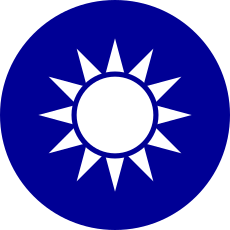
.svg.png)